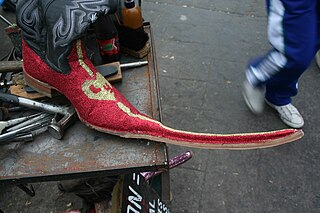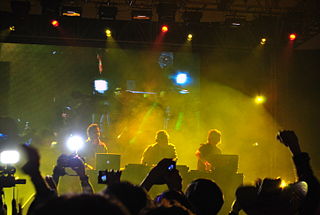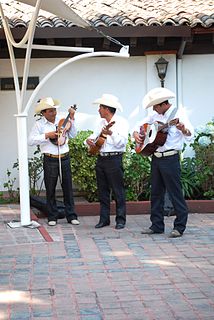The music of Latin America refers to music originating from Latin America, namely the Romance-speaking countries and territories of the Americas and the Caribbean south of the United States. Latin American music also incorporates African music from slaves who were transported to the Americas by European settlers as well as music from the indigenous peoples of the Americas. Due to its highly syncretic nature, Latin American music encompasses a wide variety of styles, including influential genres such as cumbia, bachata, bossa nova, merengue, rumba, salsa, samba, son, and tango. During the 20th century, many styles were influenced by the music of the United States giving rise to genres such as Latin pop, rock, jazz, hip hop, and reggaeton.
The term rumba may refer to a variety of unrelated music styles. Originally, "rumba" was used as a synonym for "party" in northern Cuba, and by the late 19th century it was used to denote the complex of secular music styles known as Cuban rumba. Since the early 20th century the term has been used in different countries to refer to distinct styles of music and dance, most of which are only tangentially related to the original Cuban rumba, if at all. The vague etymological origin of the term rumba, as well as its interchangeable use with guaracha in settings such as bufo theatre, is largely responsible for such worldwide polysemy of the term. In addition, "rumba" was the primary marketing term for Cuban music in North America, as well as West and Central Africa, during much of the 20th century, before the rise of mambo, pachanga and salsa.

The music of Mexico is very diverse and features a wide range of musical genres and performance styles. It has been influenced by a variety of cultures, most notably the culture of the indigenous people of Mexico and Europe. Music was an expression of Mexican nationalism, beginning in the nineteenth century.
Bolero refers to two distinct genres of slow-tempo Latin music and their associated dances. The oldest type of bolero originated in Spain during the late 18th century as a form of ballroom music, which influenced art music composers around the world, most famously Maurice Ravel's Boléro, as well as a flamenco style known as boleras. An unrelated genre of sung music originated in eastern Cuba in the late 19th century as part of the trova tradition. This genre gained widespread popularity around Latin America throughout the 20th century and continues to thrive.
The guaracha is a genre of music that originated in Cuba, of rapid tempo and comic or picaresque lyrics. The word had been used in this sense at least since the late 18th and early 19th century. Guarachas were played and sung in musical theatres and in low-class dance salons. They became an integral part of bufo comic theatre in the mid-19th century. During the later 19th and the early 20th century the guaracha was a favourite musical form in the brothels of Havana. The guaracha survives today in the repertoires of some trova musicians, conjuntos and Cuban-style big bands.

"Techno Cumbia" is a song recorded by American singer Selena for her fourth studio album, Amor Prohibido (1994). It was posthumously released as the b-side track to "Dreaming of You" through EMI Latin on August 14, 1995. "Techno Cumbia" was written by Pete Astudillo and co-written and produced by Selena's brother-producer A.B. Quintanilla. The song is a techno-pop cumbia recording with influences of dancehall, rap, Latin dance, and club music. Lyrically, Selena calls on people to dance her new style the "techno cumbia" and calls out those who can't dance.

Universal Music Latin Entertainment, a division of Universal Music Group (Vivendi), is a record company specialized in producing and distributing Latin music in Mexico, the United States, and Puerto Rico. UMLE includes famous Latin music labels such as Universal Music Latino, Fonovisa Records, Universal Music Mexico, Capitol Latin, Machete Music and Disa Records.

Celso Piña Arvizu was a Mexican singer, composer, arranger, and accordionist, mainly in the genre of Cumbia, being one of the most important musicians in the style of "Cumbia rebajada".

Mexican pointy boots or Trival boots are a style of pointed fashion boots made with elongated toes that are popular footwear for men in parts of Mexico. The boots are commonly worn in an ironic and comedic way by males involved in the Trival music subculture.

3BallMTY is a Mexican pop DJ group from the city of Monterrey, Nuevo León, Mexico. The "DJ Collective" was formed in 2009 by two teenage DJs – Sergio Zavala, and Alberto Presenda. The name "3Ball" comes from the Spanish word "tribal", which refers to the culture of Guaracha tribal music popular in many Spanish-speaking countries around the world.

Inténtalo is the first studio album by Mexican group 3Ball MTY. It was released on December 6, 2011 under Fonovisa Records label.
Electro house is a genre of electronic dance music characterized by heavy bass and a tempo around 130 beats per minute. Its origins were influenced by tech house and electro. The term has been used to describe the music of many DJ Mag Top 100 DJs, including Benny Benassi, Daft Punk, Skrillex, and Steve Aoki.

Son mexicano is a category of Mexican folk music and dance that encompasses various regional genres, all of which are called son. The term son literally means "sound" in Spanish, and is also applied to other unrelated genres, most notably son cubano.
Christian electronic dance music, also known as CEDM, Christian EDM, Christian Dance Music, CDM, or Christian electronic music is a genre of electronic dance music and Christian music. Its musical styles closely mirrors non-Christian EDM; however, the CEDM culture's lack of drug use and emphasis of positive lyrics distinguish it from non-religious counterparts. EDM.com wrote "the [CEDM] culture can feel quite welcoming." Many different Groups such as Christian Electro Spot, Found Beats, God's DJs, and CEDM Radio have been created to support and foster the CEDM genre. Many live concerts and events have been held in Christian churches in addition to traditional venues such as Lumination, Creation Festival and LifeLight Music Festival. CEDM has also been incorporated into some Christian worship routines.







